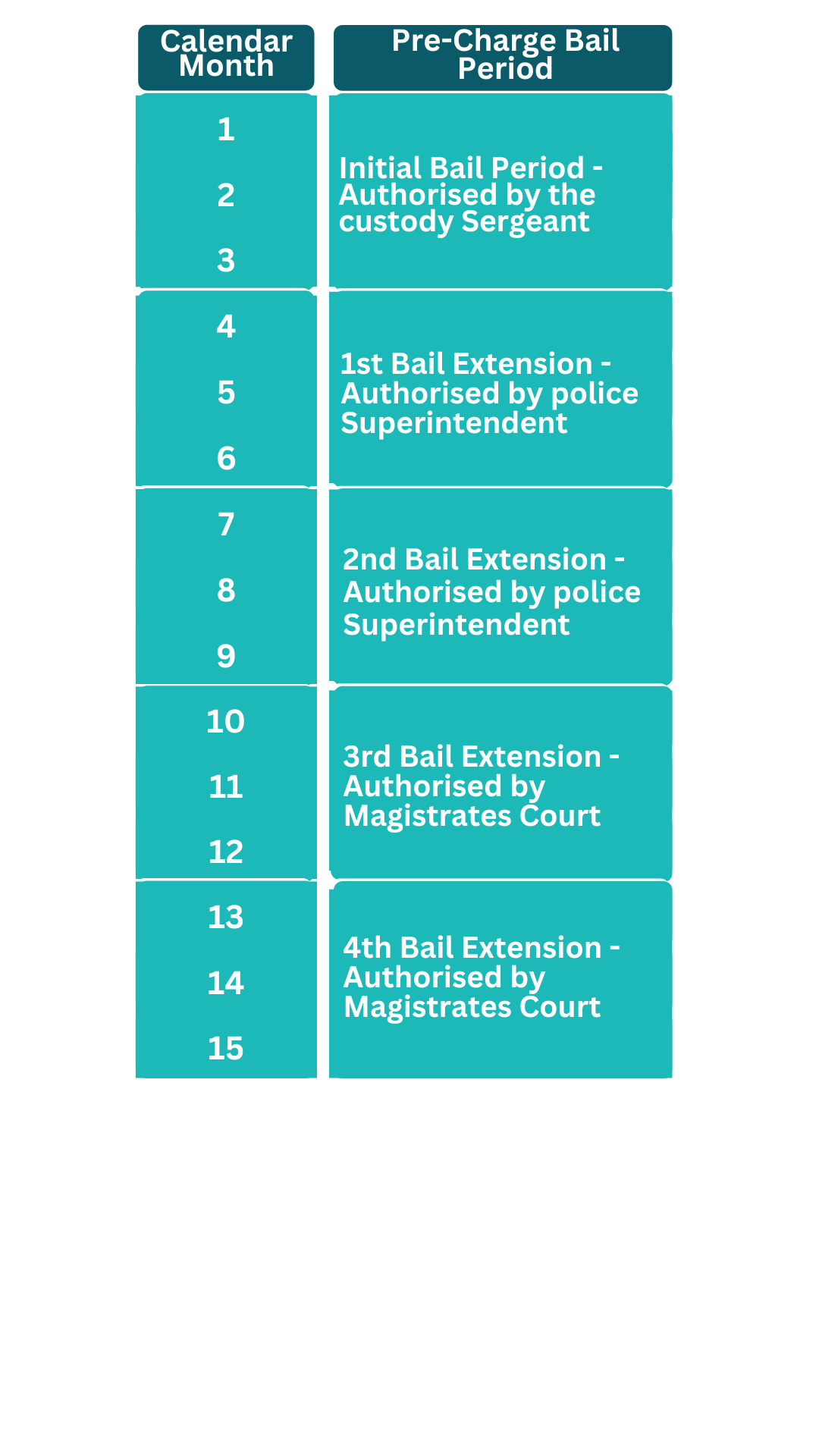What is Bail?
Bail is a set of restrictions imposed on a suspect of a criminal offence to ensure they comply with a
police investigation
or the court process, and to also ensure that they appear back at the police or court when they are required to do so.
Bail Before Charge
To be placed on police bail you would have been arrested for a criminal offence. Most sexual offences are serious, and there is often the need to arrest a suspect to protect witnesses or to seize potential evidence such as clothing and/or electronic equipment.
The circumstances which may lead to a suspect being made subject to police bail are:
1. Where there is as yet insufficient evidence to charge a suspect and they are released pending further investigation (sections 34(2), 34(5) and 37(2) of the
Police and Criminal Evidence Act 1984
(PACE)
2. Where the police consider that there is sufficient evidence to charge, but the matter must be referred to the CPS for a charging decision (s.37(7)(a) PACE).
3. Where it is no longer necessary to detain a suspect to secure or preserve evidence or obtain it by questioning, yet the police are not in a position to charge, the suspect must be released, but it is open to the police to release them on bail or without bail where there is a need for further investigation of any matter for which he was detained.
Bail cannot be placed on a person who attends the police station voluntarily.
When the police impose bail, this is referred to as
pre-charge
bail, it must only be imposed where it is necessary and proportionate to do so. When considering necessity and proportionality the police must have regard to the following factors:
(a) The need to secure that the person surrenders to custody.
(b) The need to prevent further offending by the person.
(c) The need to safeguard victims and witnesses.
(d) The need to safeguard the suspect.
(e) The need to manage risks to the public.
In addition, and where it is practicable to do so, investigators should seek the complainant's views on bail and possible bail conditions.
It is easy for the police to relate a sexual offence to each of the above and therefore, establishing a necessity is not difficult in theory. However, each reason for bail must be carefully examined as although the officers may assume risk due to the nature of the offence, the laws set by the courts may differ.
Example – Indecent Images of Children and Police Bail
At Eventum Legal we have many clients approach us who are made subject to bail conditions when suspected of committing offences which relation to the
making, possession and/or distribution of indecent images of children.
Bail conditions usually relate to their contact with children under the age of 18, this is usually prohibited completely or allowed only with a supervising adult who is aware of the allegations. The reason for such a restriction is to protect children, a specific group of the public. Although this may seem reasonable to the police, what the law says is different.
The law
It is important to note, that when a person is arrested, they are a suspect, and it has not been proven that a criminal offence has been committed. The investigation for any sexual offence, particularly an alleged image offence is likely to go on for a significant period of time as the forensic examination can cause delays.
Image offences are not contact offences, a person who is suspected of being in possession of, making or distributing illegal imagery or videos is not under arrest for child sexual abuse and therefore, this questions the proportionality of restricting contact with children, and this is exactly the basis on which an application should be made to the court when seeking to vary this condition.
Key Case Law
The case of R v Smith and oths [2001] EWCA Crim 1772 is a key piece of law that assists defence lawyers challenging the lawfulness of contact prohibitive conditions in an image case. Although the case relates to contact conditions imposed by way of a
Sexual Harm Prevention Order
(SHPO), the same principles apply to police and court bail. The principle being that it is not necessary nor proportionate to impose contact restrictions in case concerning indecent images offences.
Our lawyers have a 100% success rate in achieving a variation of bail in such cases.
Other Sexual Offence Cases and Police Bail
Most bail conditions in cases concerning false allegations of
rape,
historic sexual offences, or
sexual assault
will relate to contact with the complainant and any other prosecution witnesses. They may also extend to restricting travel, restricting your ability to go to a certain house or area, and they may also restrict you from carrying out your work.
Applying to Vary Pre Charge Bail
All bail conditions are able to be challenged, but there must be strong grounds to do so. The first step would be liaise with the officer in charge of the investigating the allegations, and ask them whether they agree to vary the conditions and explain the reasons why with any supporting applicable law.
If the officer in charge does not agree, then an application to the Magistrates Court can be made.
Bail Time Limits
In cases to which bail time limits apply it is for the police to monitor and extend those periods according the law, including making applications to the court where necessary. The table below explains the
pre charge bail
periods, and when the police are required to make an application to the court to further increase a suspects bail time.






